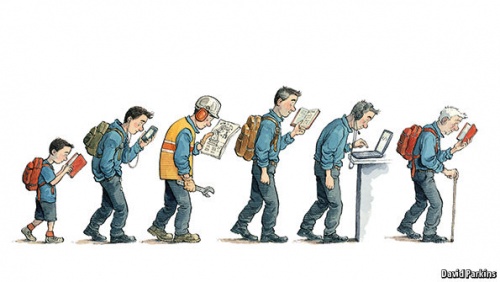Lifelong Learning part 4
Traditionally, parents tell their children to go to school, study hard, pass exams, get a degree, find a job, and work there until they retire. Now, time has changed with a lot of confusing and uncertainty, what can parents tell their children? That is the question several parents ask me. A mother wrote: “I hear that all students must learn science, engineering, technology, and math (STEM) because they are the foundation of all the jobs in the future. But I do not know what are they?” Another father asks: “Does that mean students should not study business, arts, history or literature?” One parent wrote: “I always advise my children to study banking or business because they are the jobs that pay big money. Now, what can I tell them?”
Today technologies impact every industry, every business, and every country and the idea of working in one job, one company for the entire life is completely obsolete. And soon many jobs will be done by “smart machines, ” and people will not be able to get a job unless they have the appropriated skills that are in high demand. However, my advice is NOT about what field to study because things will change, but students must consider education as a lifelong journey where they have to continue to learn whatever needed to meet the market demand.
Today technology is an important skill, and everyone needs to be able to use computers, search information on the Internet, use basic applications such as word processors and spreadsheets, etc. Every student must know how to write code, and use computer technology to continue to learn new knowledge and skills. As technology will continue to change, everybody must be able to adjust and evolve with these changes. In my opinion, it does NOT matter what you study, but you must know how to use technology and be able to apply technology to what you study. For example, if you learn arts, you must know how to use a computer to assist you in your design and creativity. If you learn music, you should use a computer to help you to write music instead of writing all the notes by hand. It is important to consider technology as a TOOL to help you to do whatever you need.
I answered many parents emails by letting them know that as new technology emerges and others become obsolete. Achieve a career success is not based on what students know but on what they can learn. The fact is the jobs that people do today will not be the same in the future. The skills people have today will not be the skills that their children need to keep their job in the future. Regardless where they live and who do they work for, all students must be ready to adapt to the changing market needs, and it is up to them and their family to prepare for their future career by developing a lifelong learning habit.
The best way to develop this “lifelong learning” skill is to start with the reading skill when children are still young. The basic of reading requires good vocabulary and word recognition where children build a foundation. By the time they go to high school and college, they need to get to the reading comprehension level where they understand the content fully to be able to apply it. Today many students go to college without a good reading comprehension skills. Every year, there are students who fail because they do not have good reading skills. Some told me that even they spend a lot of time to read, but still could not understand the concepts in the textbooks. I advised them that to improve the reading skills, they need to know the reason for the reading so that they will read things differently. If they read a novel for enjoyment, they can only follow the scenario, then re-read them whenever they like. If they read from Facebook, Twitter, Snapchat or articles on the Internet, they can glance through many things and not focusing on anything, unless they find something interesting. However, when reading the textbooks, they must identify important things to understand the concepts. They cannot read textbooks as they read from the Internet or a novel.
Today having a college degree is not a guarantee for anything. Even getting a job does not answer the need for the continuous learning new skills, especially in a time when technology changes fast. Vocational training is good at giving people some specific skills, but those skills will need to be updated every few years. My advice to all students is “Continue to learn new skills by reading and following the trends in the industry and ready to adjust, adapt and learn new skills then you will not have to worry at all.”
Sources
- Blogs of Prof. John Vu, Carnegie Mellon University
